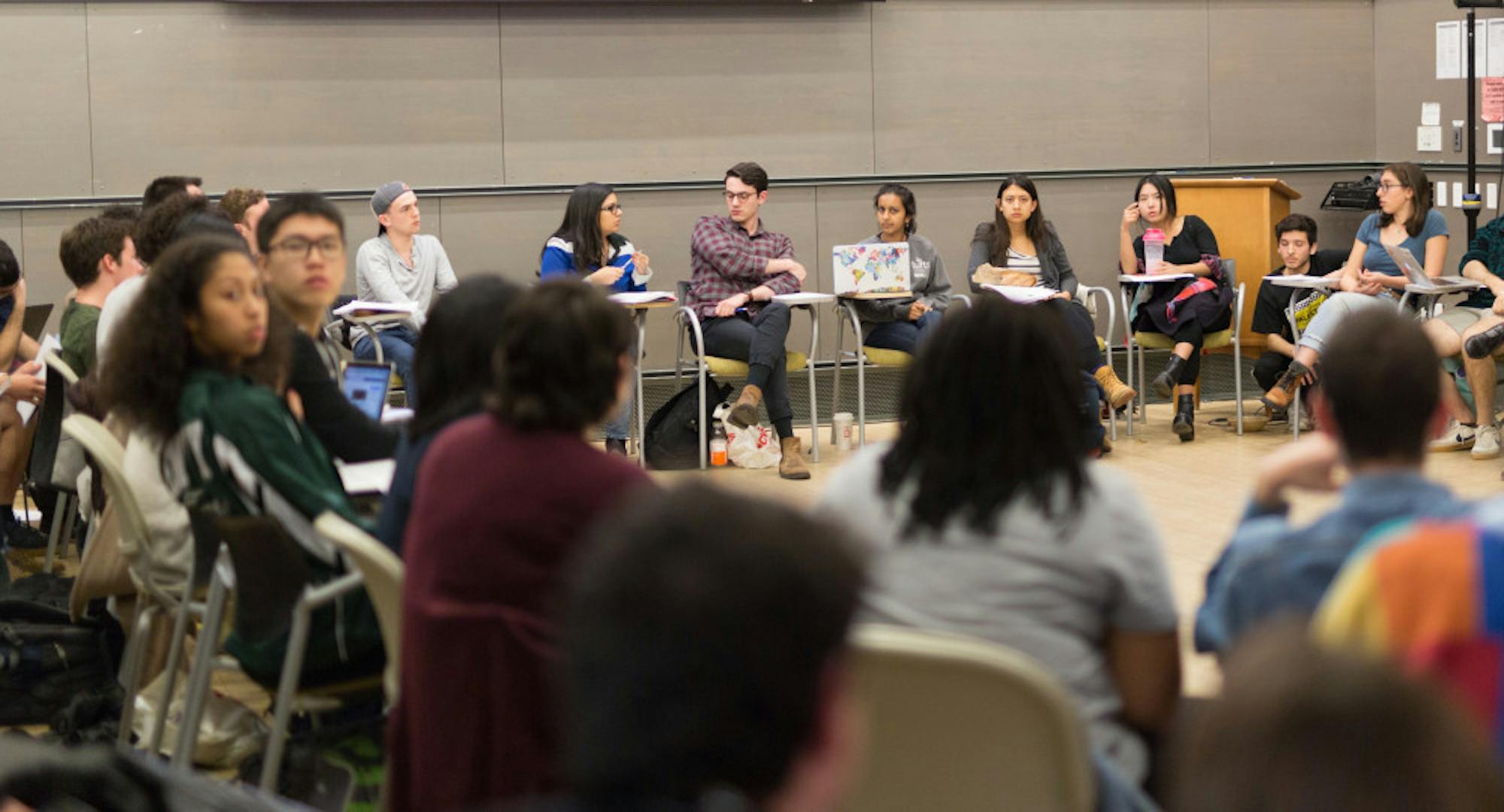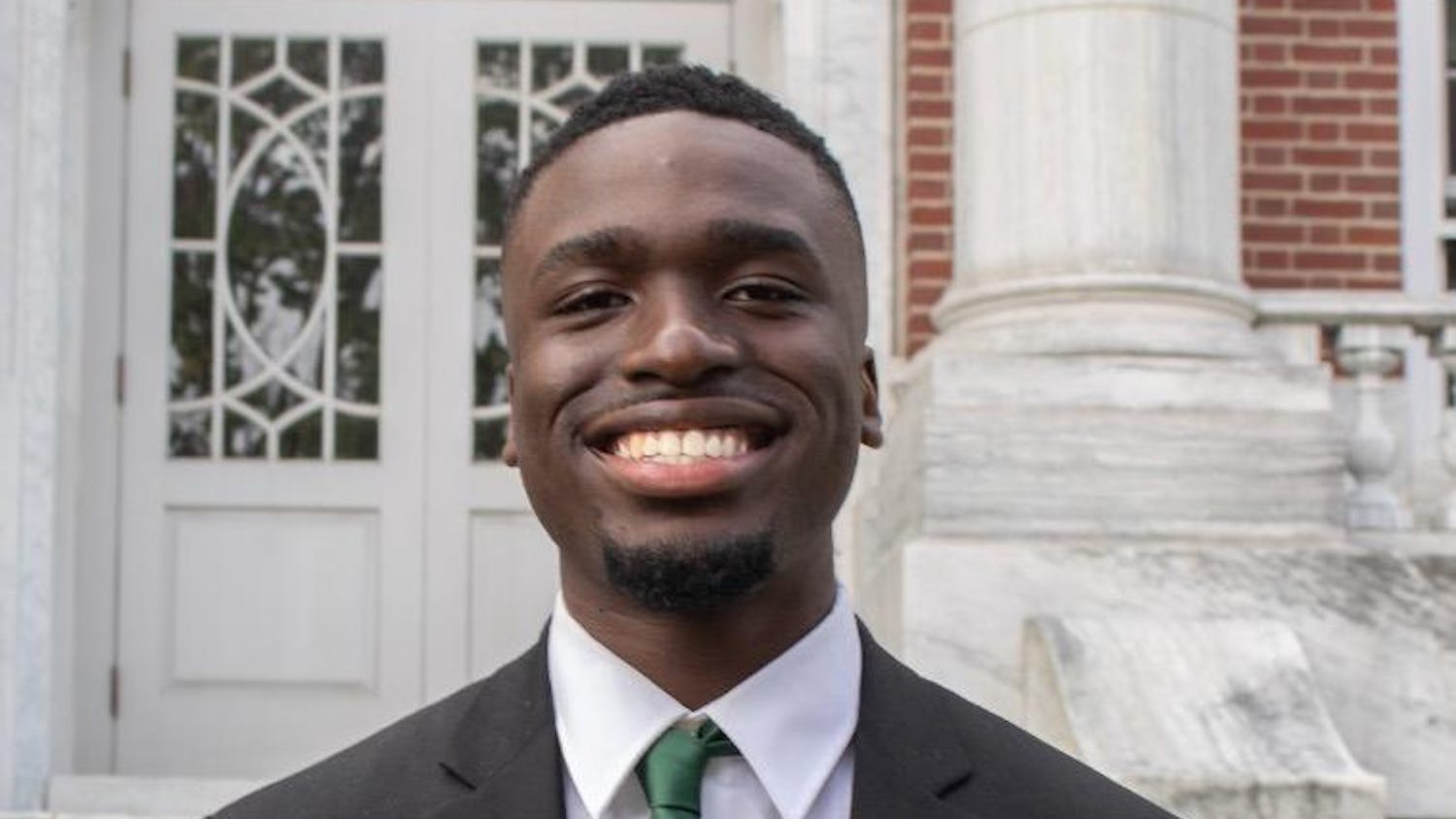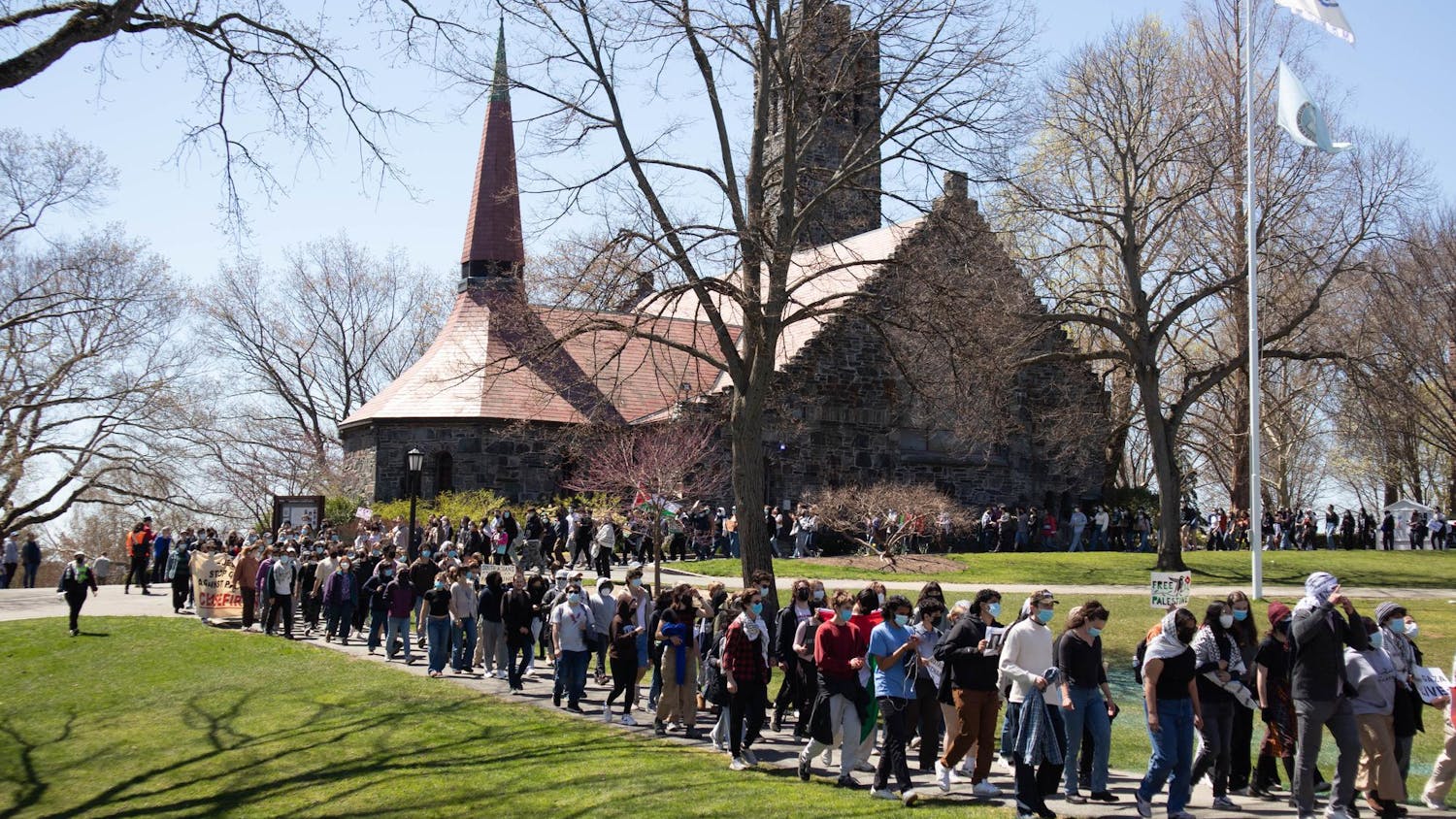When the meeting entered the discussion phase, supporters read a statement introducing and giving background to the resolution.
"We ... believe that Israel is committing massive human rights violations and that the four corporations articulated in this resolution facilitate these injustices," the statement read. "We are following the Palestinian Civil Society’s call to boycott corporations and institutions that profit off of injustice."
The statement drew parallels between the resolution and a 1979 vote that encouraged Tufts to divest from apartheid South Africa, and called for Tufts to divest from Elbit Systems, G4S, Northrup Grumman and Hewlett Packard Enterprise for their ties to Israeli military and prison technology.
The resolution also called for Tufts to place a screen on its investments that would account for human rights compliance. According to the resolution, although Tufts' specific investments are unclear, the investment policies do not currently account for the investments' social impact.
In a statement from the Office of the University President, Tufts stated that it does not support boycotts of Israeli institutions.
"While members of our community vigorously debate international politics, Tufts University does not adopt institutional positions with respect to specific geo-political issues," the statement read.
In addition, the statement noted that Tufts' ability to divest is limited because it does not invest in specific firms.
In the Senate debate, the resolution's backers emphasized that the goal of the resolution is to make a statement that Tufts should not profit from human rights abuses. In a later interview, Noah Habeeb, one of the authors of the resolution, explained that passing the resolution was just a first step.
"I want this to be the beginning of a conversation," Habeeb, a fifth-year, said. "We don't see it as the end of the process but the beginning. We also would love to receive more information from the Board of Trustees or others that could help us make this human rights screen a reality."
The Senate meeting on Sunday was the last of the semester, but also took place the day before the Jewish holiday of Passover, leading some to worry that opponents of the resolution could not attend. Sophomore Class Senator Nesi Altaras, who strongly opposed the resolution, expressed concern that the timing of the resolution was deliberate.
One of the resolution's co-authors, senior Hannah Freedman, insisted that the timing was not intended to be close to Passover. In an interview she pointed out that comments submitted online from those who could not attend were read aloud during the meeting.
Freshman Class Senator Pedro Lazo-Rivera said that, even if the resolution was not intentionally set to be the day before Passover, the number of students on both sides who asked for the resolution to be tabled so they could be heard proved that the resolution was ill-timed.
"This resolution could have been powerful, it could have been the chance for collaboration, this resolution was a chance at building bridges, and the timing of it just burnt them down," Lazo-Rivera said in an interview. "I think if people are coming forward and saying that they feel marginalized, cut out and unsafe because they feel unable to participate in this conversation, that matters. And that needs to be acknowledged and that needs to be addressed."
Habeeb criticized the allegations that the resolution was intentionally timed during Passover.
"I can tell you we had no intention of timing it during a Jewish holiday," Habeeb said. "And I think that ... implicit in [that claim] is the assumption that Jewish students who would not be here the day before Passover because they're practicing Judaism would also be anti-BDS students. And to me, that's a conflation between practicing Judaism and performing Zionism."
In addition, Tufts Friends of Israel Co-President Jenna Friedman worried that the resolution had not been given enough public attention.
"If education and dialogue were a priority, there would have been more campus dialogue about this specific resolution," Friedman, a senior, said in an interview. "I take issue with the fact that [the introduction of this resolution] was done so clandestinely."
In particular, she expressed concern that the issues behind the resolution were too complex to be discussed in the short time between the resolution draft's release and the Senate vote.
"There was no opportunity for all of campus discussion outside of that one Senate meeting, which ... is extremely difficult to parse through," Friedman said. "You have 30-second time slots in which people are jumping back and forth, and that’s not the same thing as … one person talking for five minutes about their connection to the two-state solution. There’s not the kind of opportunity … to really come to an understanding about all of the narratives that play into this."
The language of the resolution itself also came under scrutiny. Sophomore Eva Kahan said that much of the resolution was ambiguous, leaving it up to interpretation and implying ties to the Boycott, Divestment, Sanctions (BDS) movement.
"For example, debates over the use of ‘the occupation of all Arab lands’ gives the sense that the goal of the movement is the destruction of the state of Israel," Kahan said in an interview. "And whether or not that was the intention of this resolution, that is some of the language that was included because that's the language that's attached to the BDS movement as a whole."
Altaras also criticized the wording of the resolution.
"The language of that resolution, that was deliberately vague enough to allow for an interpretation that meant there should not be a state of Israel, is anti-Semitism," Altaras said.
Freedman rejected claims that the resolution could imply a question of Israel's right to exist.
"This resolution was not deciding the question of Israel's existence, it was proposing divestment from corporations that profit off of the Israeli occupation of Palestine," she said.
Student safety was also a central concern of the discussion. To protect students from possible harrassment, the Senate livestream of the resolution meeting was audio-only, and senators and audience members were not referred to by name. Photography and video recording were also prohibited inside the Sophia Gordon Hall Multipurpose room during discussion of the resolution.
"There have been numerous recent incidents regarding groups like the Canary Mission, who publish public information about people who support BDS and other anti-Israel measures, and we wanted to ensure that we maintained the safety of everyone in the room," Parliamentarian Adam Rapfogel told the Daily in an electronic message.
At one point during the meeting, a student was seen videotaping the meeting. The Tufts University Police Department (TUPD) was called and the student was asked to delete the video and leave the room. Another student was accosted for having his phone out, and people in the room were asked to refrain from using their phones during the rest of the meeting.
"Unfortunately, we're used to these forms of repression and surveillance," Habeeb said, referring to concerns about safety. "It happened on this campus before and unfortunately it might again. But at the end of the day, for me, it's a relatively small cost to pay."
Freedman agreed, saying that people who organize for Palestinian causes are often targeted by political repression.
"Students and faculty on this campus that have been involved in Students for Justice in Palestine have profiles on a McCarthy-era scare tactic website," Freedman said.
Habeeb expressed hope that the resolution could pave the way for other divestment campaigns at Tufts."And personally, in the future, I think it would be great — I won't be here — but I think it would be great if people launch other divestment campaigns like prison divestment," Habeeb said. "And if we could get work done around that, which I know people have organized on in the past ... hopefully this can set an example for successful divestment resolutions."






